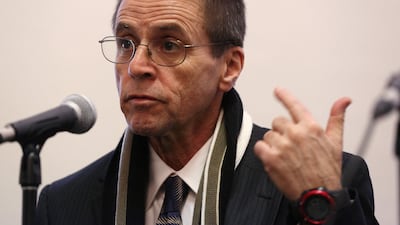A Paris court convicted a Lebanese-Canadian professor in absentia on terrorism charges on Friday and sentenced him to life in prison over a deadly Paris synagogue bombing in 1980.
The attack was once one of France's biggest unsolved crimes.
Hassan Diab, who lives and teaches in Ottawa, Canada, was convicted of terrorist murder for the attack that killed four and wounded 46. The court has issued a warrant for his arrest.
Diab has denied any wrongdoing, saying he was not even in the country at the time of the attack.
For victims, the ruling means justice at last more than four decades after a bombing described as the first anti-Semitic terrorist attack in France since the Second World War.
French authorities accused Diab of planting the bomb on a motorbike outside the synagogue on Rue Copernic in Paris, where 320 worshippers had gathered to mark the end of a Jewish holiday on the evening of October 3, 1980.
Several were children celebrating their bar mitzvahs at the time.
Investigators initially suspected far-right extremists, before shifting their focus to Palestinian militants, eventually attributing the attack to the Popular Front for the Liberation of Palestine-Special Operations.
No person or group ever claimed responsibility for the attack.

Friday's conviction was a surprise to many, even in the court. Among the defence witnesses was a magistrate who investigated the case and said that there was not enough evidence to convict Diab.
Diab, speaking to reporters in Ottawa, reacted to the verdict by calling it “Kafkaesque” and “not fair”.
His lawyers say he was in Lebanon studying for university exams at the time of the attack and is a victim of mistaken identity, a scapegoat for a justice system determined to find a culprit.
“We'd hoped reason would prevail,” he added.
Canada authorised his extradition to France in 2014 as part of the investigation, but after three years in pretrial detention, antiterrorism judges ordered him freed for lack of evidence. Then, an appeals court ruled that he should stand trial on terrorism charges.
“We will look carefully at next steps, at what the French government chooses to do, at what French tribunals choose to do,” Canadian Prime Minister Justin Trudeau told a news conference.
The head of France's leading Jewish group, Crif, welcomed the conviction, and urged Canada to arrest Diab. The victims’ lawyers say the long-awaited trial will serve as a deterrent for future terrorist and anti-Semitic acts.
Prosecutors argued that Diab has been lying to himself for 40 years and is caught up in his denial.
Diab’s lawyer, William Bourdon, had pleaded for an acquittal, saying that convicting him would be “a judicial mistake”.
Amnesty International was among those who called for the court to drop what they call a flawed and baseless case, arguing that it “undermines effective justice for victims”.
Some lawyers for the 18 people and six groups that were party to the case acknowledged that it was hard to build a case so many years later, especially without the kind of DNA evidence or cell phone data used in current investigations.
Agencies contributed to this report

